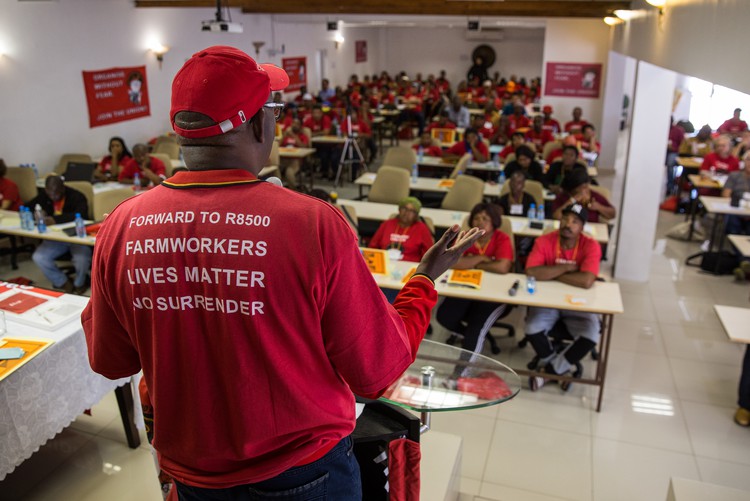
Zwelinzima Vavi addresses the Fourth CSAAWU Congress in Surrey Estate, Cape Town. Photo: Ashraf Hendricks
24 November 2017
Over 100 trade union members from farms across the Western Cape gathered for the Fourth Commercial Stevedore Agricultural and Allied Workers Union (CSAAWU) National congress. The two day conference in Surrey Estate, which started on Friday, will consider climate change, women and youth on farms, migrants, and the proposed minimum wage amongst other things.
CSAAWU organises rural workers in the Western Cape. According to a CSAAWU statement, rural workers have historically been paid the lowest wages in the country. Issues discussed included seasonal work, evictions and illiteracy on farms.
The unions are also calling for an R8,500 a month wage. The current minimum wage for agricultural workers will be R18 an hour according to CSAAWU (approximately R3,200 per month). This is to be implemented in May 2018. But due to the seasonal nature of farm work and massive unemployment levels, “workers would be lucky to get that minimum wage”, said Zwelinzima Vavi, who delivered the keynote address.
Vavi, the General Secretary of the South African Federation of Trade Unions, said that the least represented workers in the country are farm workers, domestic workers, taxi drivers, truck drivers, hotel workers, casual workers and those being exploited by labour brokers. “These are the workers ignored by the established trade unions.”
“We need a program of mass mobilisation and militant action,” said Vavi. He said that unions will meet on 20 February to discuss a general strike in South Africa against job losses, seasonal work and “all of these things that keep us down”. He continued: “But on May Day we want a total shutdown of workers to say voetsek Ramaphosa and your R3,000. We want R8,500.” He was referring to the National Minimum Wage agreement signed by Deputy-President Cyril Ramaphosa in February.
Vavi said farm workers work under appalling conditions. Very little has changed on farms since 1994. He said, “Workers are defenseless against their ruthless bosses.”
Vavi then called for a boycott of farmer produce. “We must return to the culture of selective consumer boycotts, to punish the verkrampte farm bosses,” said Vavi. “We must mobilise our communities.”
Danielle DeWitt has been staying on a wine farm in Robertson for four years. She runs a daycare where she looks after farm workers’ children. On the farm there are currently only two outside toilets which service 14 families. She said their is no clean running water for the workers. “We are getting water from the mountain.”
She said that the water comes down a canal and mixes with dirty water and rubble. They consequently have to boil the water before drinking it. “Our children’s health is the biggest problem,” DeWitt says. She says that there are boreholes, but those are only meant for the toilets.
Some of the other organisations at the meeting included the National Union of Metalworkers of South Africa and Women on Farms. Members of international trade unions in Sweden, Norway, Germany and Denmark also joined and shared messages of solidarity.